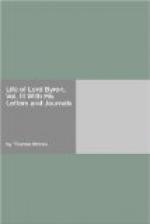“Went to Waite’s. Teeth all right and white; but he says that I grind them in my sleep and chip the edges. That same sleep is no friend of mine, though I court him sometimes for half the twenty-four.
“February 20.
“Got up and tore out two leaves of this Journal—I don’t know why. Hodgson just called and gone. He has much bonhommie with his other good qualities, and more talent than he has yet had credit for beyond his circle.
“An invitation to dine at Holland House to meet Kean. He is worth meeting; and I hope, by getting into good society, he will be prevented from falling like Cooke. He is greater now on the stage, and off he should never be less. There is a stupid and under-rating criticism upon him in one of the newspapers. I thought that, last night, though great, he rather under-acted more than the first time. This may be the effect of these cavils; but I hope he has more sense than to mind them. He cannot expect to maintain his present eminence, or to advance still higher, without the envy of his green-room fellows, and the nibbling of their admirers. But, if he don’t beat them all, why then—merit hath no purchase in ‘these coster-monger days.’
“I wish that I had a talent for the drama; I would write a tragedy now. But no,—it is gone. Hodgson talks of one,—he will do it well;—and I think M—e should try. He has wonderful powers, and much variety; besides, he has lived and felt. To write so as to bring home to the heart, the heart must have been tried,—but, perhaps, ceased to be so. While you are under the influence of passions, you only feel, but cannot describe them,—any more than, when in action, you could turn round and tell the story to your next neighbour! When all is over,—all, all, and irrevocable,—trust to memory—she is then but too faithful.
“Went out, and answered some letters, yawned now and then, and redde the Robbers. Fine,—but Fiesco is better; and Alfieri and Monti’s Aristodemo best. They are more equal than the Tedeschi dramatists.
“Answered—or, rather acknowledged—the receipt of young Reynolds’s Poem, Safie. The lad is clever, but much of his thoughts are borrowed,—whence, the Reviewers may find out. I hate discouraging a young one; and I think,—though wild and more oriental than he would be, had he seen the scenes where he has placed his tale,—that he has much talent, and, certainly, fire enough.
“Received a very singular epistle; and the mode of its conveyance, through Lord H.’s hands, as curious as the letter itself. But it was gratifying and pretty.
“Sunday, February 27.
“Here I am, alone, instead of dining at Lord H.’s, where I was asked,—but not inclined to go anywhere. Hobhouse says I am growing a loup garou,—a solitary hobgoblin. True;—’I am myself alone.’ The last week has been passed in reading—seeing plays—now and then visiters—sometimes yawning and sometimes sighing, but no writing,—save of letters. If I could always read, I should never feel the want of society. Do I regret it?—um!—’Man delights not me,’ and only one woman—at a time.




